Signs That You Don't Understand Obesity
It's a mystery wrapped in an enigma!
Warning: 4,500 word rant
There are a lot of people out there who love to talk about obesity or weight loss. A lot of them don’t know the first thing, and there are easy signs that give it away. I immediately stop listening to those people if they send more than 1 or 2 of these “ignorance” signals.
Sometimes I still argue with such people, even if I don’t see a high chance of them changing their opinion. That’s because arguments, for me, aren’t necessarily about convincing the other person - you could be sharpening your own arguments, clarify your understanding, and you could convince bystanders if the debate is in public (which it is, on most of the internet).
Here are some common “ignorance signs.”
Note: this is about reversing obesity. Getting on a bodybuilding stage or Men’s Health cover is very different, and those people might be very good at achieving those goals. I am merely concerned with reversing obesity or severe overweight and reaching a healthy & comfortable body fat level while eating “normally,” i.e. ad libitum carolie intake.
"Full"
If you confuse physical fullness with satiety, you’ve disqualified yourself from obesity talk. It’s often used as a shortcut and that’s fine if you don’t want to say “satiated” all the time.
But the sensation of being physically full and the state of metabolic satiety are so different that I prefer not to ever muddy up the waters.
Many people seem to unironically believe that “being full” is in some way positive or related to satiety, and then they (logically) conclude you should eat high-fiber, low-carolie foods.
Of course this it total nonsense; physically distending your stomach doesn’t do anything for nutrition. Taken to the extreme, this would lead you to eat tree bark and rusty nails, both of which are VERY low in humanly digestible carolies and provide lots of “roughage.”
Maybe you can trick yourself into feeling like you’ve had any nutrition by eating a “big ass-salad” with near-zero nutrition in it, but let’s not pretend this will solve the obesity crisis.
For the record, I hate being “full.” I’d much rather be satiated on an empty stomach.
If being full is the same as being satiated for you, that’s evidence that you’ve never experienced what most obese people experience every day - being physically bloated, often to the point of pain, yet ravenous.
It’s sort of like starting basketball advice with “First, be 6’9 tall.” It’s not wrong, but it’s also not helpful - it just shows us you have a (genetic?) predisposition that makes your advice largely irrelevant to the rest of us.
Lean people just eat less
Yea, and rich people just make more money, duh. You’re just moving the mystery to the next level. WHY do some people “overeat” and some don’t? And how come they only started doing that about 150 years ago? And how come more and more of us are affected by this mysterious overeating condition, and more so every year?
If your answer is any variation of “because fat people are more hungry” then.. again… why.
Any real root-cause analysis of obesity must explain the Mysteries of Obesity, as laid out by Slime Mold Time Mold. For example, I think that seed oils explain these mysteries quite well.
“Boring” advice
This brings us to the next sign: claiming that there are no mysteries at all. If you take a look at the obesity epidemic and you’re not mystified, you need new glasses.
There are a lot of people out there, typically “evidence-based” gym bros, who claim that “there is no magic trick” and no “single thing that explains it all” and that you just have to “do the slow, boring work.”
Sometimes I can’t even get them to define what they mean by work, and I find it difficult to do something when I can’t know what it is.
But typically these guys mean “counting carolies” by which they mean eating less and exercising more - which has, of course, been debunked thoroughly, and which every obese person has already tried.
This is just rhetorical framing, there’s no argument: CICO is also “just one thing” and “monocausal” and “simple” and I could flip the argument around, and in fact I often do.
We all want obesity to be easily fixable with a simple, monocausal intervention like carolies, but biology is just more complex than that, and you have to do the slow, boring work of actually figuring out what’s wrong.
Suggesting ideas that have already failed
This is of course a big one. Because I’m relatively active on Twitter, Reddit, or in the comments here, people give me “weight loss tips” as if I hadn’t tried everything under the sun.
Of course they probably just don’t know what I’ve already tried since they just encountered me. But the advice is typically pretty inane and wouldn’t work for anyone with a seriously messed up metabolism, which is *checks watch* 45% of the United States at the time of this writing. (Probably 46% by the time you read this.)
People are very confident in their tips though, either because “everybody knows” or because it worked for them.
If it worked for them, that’s great, but clearly not everything works for everyone. I’m not telling everyone to drink heavy cream all day long.
If you already tried strategy X and someone is suggesting X as The One Solution, you know he has nothing to contribute to your fat loss experiments. You can conveniently ignore his advice.
Here are some common examples people throw at me which they just “know” are the be-all, end-all to fat loss & obesity:
CICO
This is one of the big ones, of course. People just KNOW that the laws of physics cannot be broken, and thus I must be lying when I said that I’ve done more CICO than them and more strictly and it hasn’t led to sustained, if any, fat loss.
Most of these people cannot correctly state CICO, and they typically keep changing up their definition throughout the argument, sometimes within the same sentence without even noticing it.
When you point out this inconsistency, they either don’t understand it, or they get angry and shout “SEMANTICS!” or some other word they don’t understand either.
CICO is like flat earth theory; it doesn’t attract smart people.
Exercise
We now know why, but anecdotally most obese people have tried various forms of exercise over time. It is quite common to see near-zero weight loss from it, but often appetite goes up and if people don’t then eat more, they start getting into overtraining/lack of recovery/lack of energy scenarios. If they do eat more, it’s common to gain even more weight, at which point the people who shouted “EXERCISE!” to begin with roll their eyes and shout “OF COURSE you got even fatter, you should’ve not eaten when the exercise made you hungry!”
Pontzer’s book Burn shows us why this doesn’t work; burning calories via exercise doesn’t burn any calories.
What that means it that if you choose to exercise, for most people, that does not increase total energy expenditure. It just re-routes energy from other places like the nervous system, immune system, digestive system..
Interestingly, Pontzer says there is a small sliver of the population for whom it DOES increase TEE by quite a bit.
He isn’t sure why because his studies only show correlation, not causation, but he speculates it could be genetic.
But this would explain why exercise DOES work for a few select people, and those people then yell at the rest of us.
But for most people ever tested, additional exercise typically does not raise TEE and typically leads to zero or near-zero fat loss, ever.
No, that other type of exercise
Duh, of course you shouldn’t do weight lifting/jogging/cycling/swimming/zone 2/hiking/walking, it actually makes you fat!
You need to be doing weight lifting/jogging/cycling/swimming/zone 2/hiking/walking!
Everyone knows this…
Unfortunately there is a near-infinite number of types of exercise people “know” is the only one that works.
Like most obese people, I’ve tried a lot of different variants of the years, and none of them led to any fat loss at all. Not even a tiny bit temporarily. With weight lifting, I even gained a huge amount of weight, probably because it made me super hungry and I ate a ton of protein then.
Counting carolies
I am always confused as to what the counting of something could possibly do to my fat loss, but these people typically just mean..
Eating less
Ah, yes, eating less. I mean, have you even TRIED IT?!
Yes, yes we have. Trust me, every obese person has tried eating less. Most have tried counting the carolies too, and neither of them led to any sustained fat loss, if there was any loss at all.
People somehow think this is breaking the laws of physics, but this just shows you they don’t understand CICO (or the laws of physics).
CICO is perfectly compatible with “I ate less and I gained weight.”
If you disagree, you don’t understand CICO. Which is 99% of CICO advocates.
There’s a reason no serious nutrition scientist advocates naive CICO. Don’t take my word for it, this was told to me by a serious nutrition scientist.
“So you’re saying you broke the First Law of Thermodynamics?!”
Incredibly stupid. This implies both misunderstanding of CICO, of thermodynamics, and bad faith. Next.
Fasting
I used to be big into fasting. I still think fasting can have some therapeutic benefits, and I also think it’s a good measure of your metabolic health.
If you’re metabolically healthy, you should be able to fast for at least a few days. Think of a well-functioning caveman or hunter gatherer: there would’ve been plenty of lean times. At the least, hunting down a mammoth all day wouldn’t necessarily give you an opportunity to snack on protein bars every 30 minutes.
But I no longer believe that extended fasting is a great solution, or any solution, to reverse obesity. I just haven’t seen it.
I’ve tried it myself and it didn’t work, and I haven’t seen it work in anyone I know personally, even over the internet. Obese people tend to simply not be able to fast, which is why I think it’s a better sign of metabolic health than an active ingredient.
If you’re obese and you’re starving by day 2-3 of a water fast, you should probably quit. Forcing it won’t help. You’ve already arrived in a metabolic state known as Phase III Starvation in which your body cannot cover energy expenditure from adipose tissue and is starting to catabolize your lean tissues. This is very, very bad.
People often claim that if you just willpower through the starvation symptoms, it’ll get easier & become “effortless” and this is of course “known by everybody.”
The thing is that it does not seem to be true. It’s never worked that way for me when I fasted a lot, and I don’t know of anyone else, personally, for whom it’s gotten easier again.
I think this phenomenon just appears in people who aren’t on keto. If you’re on a high-carb diet, aren’t used to ketosis at all, and start a fast, you’re jumping into the deep end of keto - fasting will put you into ketosis like nothing else.
So you’ll have a few days of keto flu and then you’re in ketosis and you’ll feel better. This has nothing to do with fasting.
Most of the people I know in diet circles online are ketards, or at least have experimented with it, and so they wouldn’t experience the first timer keto flu. And therefore, I likely wouldn’t know anyone whom it got easier for after “powering through” the first few days of a fast.
There is 1 guy, EVER, who fasted off hundreds of pounds, Angus Barbieri. Fasting proponents keep citing him.
But if you can only ever produce 1 guy for whom it worked, and he did it in 1960s Scotland… what are the chances he was just way less PUFA’d than we are today?
Keto
I get it to this day. People suggest that if I really want to get lean, I should just try cutting the carbs!
Bro, I’m 2 months shy of my 1-decade anniversary on keto. I’m pretty sure I would've figured it out if just cutting carbs was the solution.
Carnivore
The carnivore people are even more zealous than the ketards, and there are also way more variations of it than just keto, it seems. So, like with exercise, there’s always that 1 special way in which they “just know, duh!” carnivore must be done and it WORKS FOR EVERYBODY.
But while I actually think carnivore has probably the best result rate of any mainstream diet I know of, that’s still only 25-35%. Of course there are no real numbers on any diet for this, but that’s my impression from interacting with people online.
Because of that, carnivore is actually a diet I would totally recommend people try. I mean, 30% hit chance isn’t bad. If it doesn’t work, keep looking - but you were going to keep looking anyway, right? Just give it a shot for 30 days.
But if we can’t admit that it does NOT work for everyone, it’s just zealotry.
Have you tried the Ray Peat diet
This one is almost a trick question. I’ve been reliably and rePEATedly informed by various high-level Peat gurus that there is no such thing as “the Ray Peat diet.” As such, I can’t possibly try it.
There are of course certain rules that most Peaters go by:
PUFA very bad
Keto bad
Starch relatively bad (cause it can give you digestive issues)
Sugar good
Excess muscle meat bad
Now I agree with the PUFA and excess muscle meat parts, and I’m doing those already. But I strongly disagree with the keto and sugar parts, and vaguely with the starch part.
I’ve found no diet variation in which any significant amount of sugar allowed any amount of fat loss for me, and in various combinations, it seemed to drive extreme fat gain. 5lbs in a week, making me overeat by 1,500kcal/day or so.
I also just hate the quality of life off keto. After 10 years, I’m just used to almost never being hungry, the ability to take a 18h flight and not worry about food the entire time, the calm & sleep benefits.. I just feel better on keto.
When I went back to high-carb diets for the first time in years, late last year, I discovered that I needed to eat every 2-4h or I’d become hungry & hangry, that fruit and honey are super expensive, and many other downsides.
I found out that for many Peaters, this is just “normal” or a trade-off well worth it. Well, for me it’s not. If I see zero upside, it better not be way more expensive & inconvenient.
It’s possible that there is a variation of the non-existent “Ray Peat diet” out there that would work for me, but I suspect it’d be so twisted that no normal Peater would voluntarily eat it.
Proving too much
Proving too much is a common thing not just in diet arguments. It basically means the argument doesn’t just prove your point, it also proves a lot of other things that are clearly not true.
In nutrition arguments, this typically means the argument picks up on a reason/mechanism that is way too broad to explain the obesity epidemic as it happened, and typically would “prove” that everyone from the year 1600 out was obese the whole time.
There is then often a whole bunch of confabulating about how we “just didn’t diagnose it as much” as if diagnosing obesity was difficult. Heck, children can do it!
Here are some common diet claims that prove too much:
We just have too much food now
Maybe compared to Grok the caveman, but compared to 1970? Real wages have actually stagnated or dropped; if anything, shouldn’t that produce a drop in obesity for the average person?
And in what sense do we have more food than in 1990? How come obesity in the U.S. has more than doubled since then, and the same pattern is seen in many other countries?
People used to live in caves & hunt mammoths every day
My grandfather didn’t hunt a single mammoth in his life. He was a sedentary office worker and his hobbies involved stamp collection and listening to the radio, both of which he accomplished from his armchair.
He was the most sedentary man I ever met in my life, and he was skinny as a rail the entire time. He also drank beer every day, never exercised that I know of, and lived until 95, when he just got bored and decided to die.
If people were only thin because they hunted mammoths and starved all year long, you’d expect everyone from the agricultural revolution on to be obese.
Or at least everyone after the industrial revolution, right?
But we don’t see that: people had almost unchanged obesity rates until around the mid-1800s (in America, where we seem to have the best records). And since then, obesity has grown slowly but steadily, which also contradicts this theory.
People used to get more exercise
Not true, people exercise more than ever. The fallback is “everyone used to be a farmer and that’s exercise” but that also doesn’t hold up. There were tons of non-farm people in 1970 and 2000, yet obesity has risen steadily since.
Plus, we know from Pontzer’s Burn that exercise doesn’t actually lead to fat loss in almost anyone.
People used to eat less
Or way more. Nobody knows. This is because we don’t have good records on this. You can sort of estimate it, but people disagree on which estimate is right. Just as we have estimates saying “zomg carolies went up!” we also have reports of average office workers in 1920s NYC eating 4,500kcal/day including cake with every meal, and being rail-thin.
Our modern food is just too palatable
There is sort of a flip-flop on this one, because most people just mean “tastes good” by palatable. In obesity research, palatable means “makes you overeat.”
I’d argue that our modern food is in no way better-tasting than the food my grandma cooked at home, or what people ate throughout most of human history.
Oreos are worse tasting than my grandma’s butter cookies. Domino’s tastes way worse than an Italian grandma’s home-made pizza. American fast food isn’t exactly revered around the world for its amazing culinary qualities.
My mom’s cooking wasn’t that phenomenal, but it was better than most fast food today for sure.
What about that other, technical meaning of the word “palatable?” Is modern food more “overeating-inducing?” Yes, but then the question is, of course, “why.”
Our modern food is just too carolie-dense
Is our modern food more carolie-dense than a fatty mammoth consisting of 10-15 tons of fatty meat? More than pound cake, which consists of flour, butter, and sugar?
People will then usually slide into “Ok but we didn’t eat mammoth/pound cake every day” which feeds into the “starving caveman” argument above.
I think the idea that carolie-dense foods are inherently obesogenic is clearly false. It doesn’t jive with the obesity timeline, and it isn’t the experience of any ketoer or carnivore who lost a ton of fat effortlessly.
Certainly seems like the opposite of my own experience.
Evidence-based
Maybe one day I’ll write an entire post called “Why I am not evidence-based.”
Evidence-based seems to just mean “I sit in front of the computer and read studies.” I do that a lot, too. I spent several hours the last few days reading studies on essential fatty acids from the 1920s and 1930s.
But I don’t then wholesale import the mainstream opinion of nutrition science (TM) as The Truth And Nothing But The Truth.
Why not?
First of all, because it’s clearly wrong. The things they recommend don’t pass the sniff test and they don’t work in most people. This is easy to see and easy to try.
Second, because there are clearly systemic biases. There are tons of studies contradicting many of the “consensus” points and they are simply ignored in bad faith.
If you swallow the mainstream consensus, but the consensus is systemically wrong, you’ll believe something that is wrong.
At this point, “evidence-based” people like to say something stupid like “Ohhh so you think there’s a conspiracy?!” or “You think you’re smarter than science?!”
No, I just think you’re wrong. The onus is on you to prove how you’re more correct than me. Everything else is appeal to authority.
Evidence-based is just code for “status quo nutrition science.” And the status quo is 45% obesity in this country.
Confusion about the obesity timeline
A lot of people seem to believe the obesity epidemic began in the 1970s, and that therefore seed oils dindu nothing cause they came out before that. Of course seed oilers know this and think the timeline fits perfectly.
I think this “1970 thing” in many cases (not just obesity) comes from a sort of “optical illusion” in graphs of exponential functions.
Consider this chart of obesity from 1900-2000:
Oh my gosh! There’s a clear inflection point in 1970! 1970 did obesity!
Oh wow! The inflection point was in 1990!
Of course this is the exact same exponential function/data set. We just moved the dates all the way up to 2020. If you graph any exponential function, it’ll look like a hockey stick and the “inflection point” will be around 3/4 through your time frame or whatever you have on the X axis.
This is NOT a feature of the exponential function. The exponential function grew the same every step of the way. It’s just an optical illusion.
What happens if we use the same function but go all the way out to 2070?
Clearly, obesity hasn’t actually happened yet, but will hit us like a brick in 2030!
I believe us Seed Oilers actually have by far the best timeline & understanding of obesity. Let me show you a graph from one of Chris Knobbe’s excellent presentations on seed oils:
This is one of the few graphs where they even went back in time further than 1960 or so. As you can see, there was definitely a rise in obesity starting as early as 1900!
People will claim this disproves seed oils, but of course industrial, chemical seed oil production was invented in the 1850s, and Mark Twain wrote about seed oils displacing butter and olive oil in … 1883.
Check it out in Life on the Mississippi:
There now—what do you say? butter, ain’t it. Not by a thundering sight—it’s oleomargarine! Yes, sir, that’s what it is—oleomargarine. You can’t tell it from butter; by George, an expert can’t. It’s from our house. We supply most of the boats in the West; there’s hardly a pound of butter on one of them. [..]
Why, we are turning out oleomargarine now by the thousands of tons. And we can sell it so dirt-cheap that the whole country has got to take it—can’t get around it you see. Butter don’t stand any show—there ain’t any chance for competition. Butter’s had its day—and from this out, butter goes to the wall. There’s more money in oleomargarine than—why, you can’t imagine the business we do.
Yes, it’s a first-rate imitation, that’s a certainty; but it ain’t the only one around that’s first-rate. For instance, they make olive-oil out of cotton-seed oil, nowadays, so that you can’t tell them apart.’
That’s right, U.S. fats like butter and even olive oil were being replaced en masse, at an industrial scale, to the point where a famous author reported in in 1883.
It’s no surprise then that we already saw an increase in obesity, diabetes, and heart disease by 1900:
By the 50s, we had an insane amount of obesity compared to the historic norm. By 1970 it was even higher.
But 1970 looks harmless to us now, we remember it as the days when scarcely anybody was obese.
But then again, you could say something similar for the year 2000 - when our obesity was HALF what it is now!
The “epidemic,” as in the root cause that created this trend, has been with us for over 150 years, as Twain shows.
It’s just that at every point in this exponential function (or technically the exponential part of the sigmoid), we always see an inflection point on the right side of the chart.
Claiming that GLP-1 agonists prove CICO
There was a wave of this recently. Andrew F. Huberperson and several others (Crocodile-tears Attia?) went on some podcasts and even TV shows and claimed with a very serious voice that GLP-1 agonists like Ozempic finally PROVE that obesity was caused by eating too much.
Of course this is stupid, and it proves they didn’t understand the argument against it to begin with.
I think I saw Huberperson claiming this on Bill Maher’s show, and I rolled my eyes so hard I nearly knocked myself unconscious. I hate these Very Serious Credentialed People talking absolute garbage. This is the problem in this country; grifting for ego & status instead of being intellectually curious.
Someone on Twitter, I forget who, once said it quite succinctly. I’m paraphrasing:
There used to be a debate if obesity was caused merely by an excess of calories, or if it was caused by hormonal dysfunction. GLP-1 agonists act on hormones. Yet curiously, they are taken by the calorie side as proof of their theory and they are doing victory laps.
- Someone on Twitter
The CICO idiots will immediately go “Yea but these people on GLP-1 drugs EAT LESS that’s how-” STFU. If you think this proves your side, you’re just demonstrating your ignorance of the other side’s argument, and how GLP-1 works. It’s also showing a distressing lack of curiosity and good faith.
Gosh.
Anyway, enough of my ranting. Let’s figure this thing out, shall we?
PS: Spoiler alert, I was 222.15lbs this morning, which is lower than I ever got on ex_plainrice 2 months ago. ex150nosauce (+ ACV capsules) seems to be working well.
My all-time low on ex150 style diets was 217.3lbs, meaning I am less than 5lbs away from my all-time low and there are still 2.5 weeks left in this experiment. I am cautiously optimistic.
PPS: Wow, this is my 150th published post on this blog! That’s like publishing a post a week for 3 years! Actually, that’s pretty much exactly what happened.. wow.


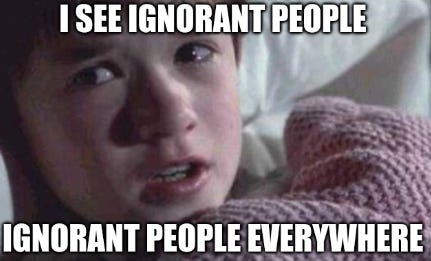

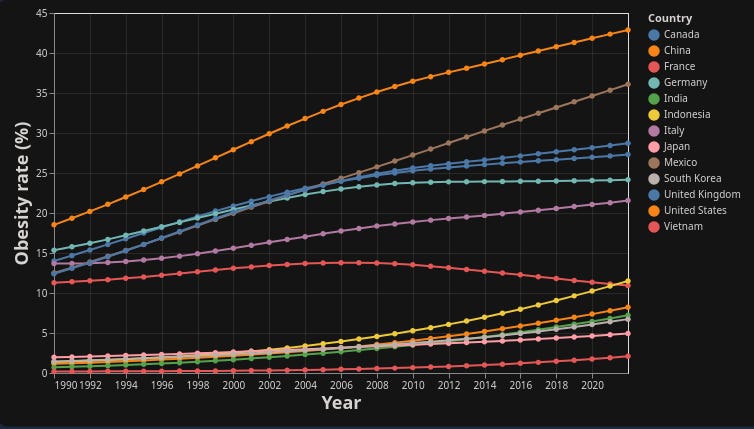
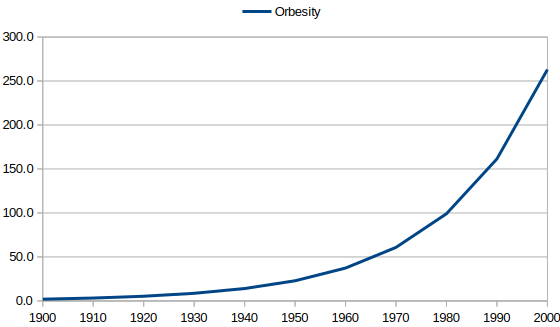
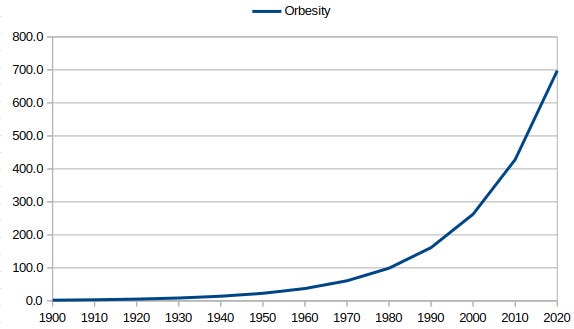
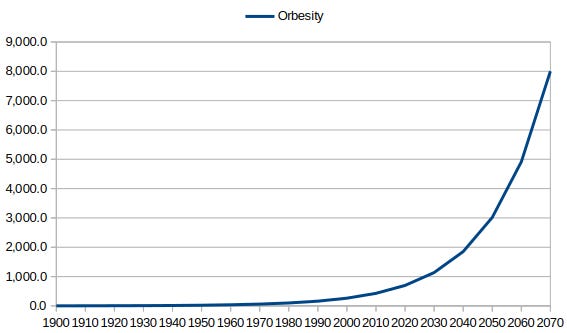
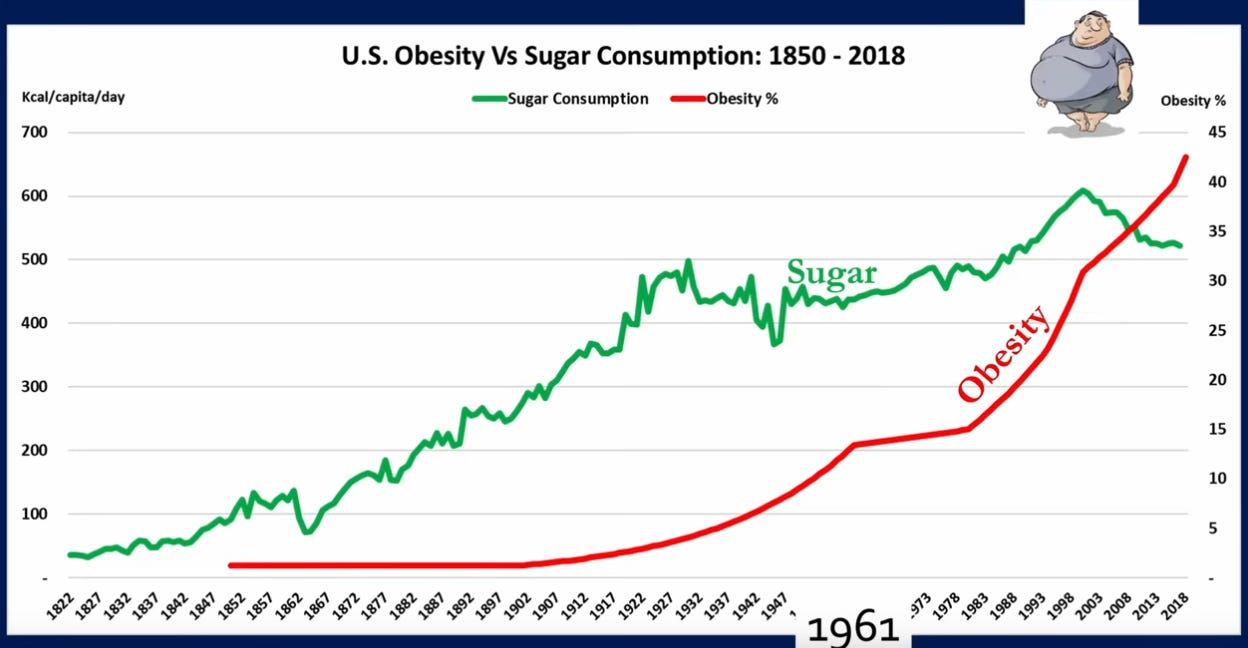
> physically full and the state of metabolic satiety are so different
Back in the dimly remembered days when obesity wasn't a problem, "being full" was what you said when you meant "I am sated". It was a metaphor.
The actual feeling of physical fullness was only experienced if you ate well beyond satiety for some reason, like I don't know, an eating competition or something, or if maybe you'd been starving and suddenly got lots of food.
I'm actually not sure I've ever experienced physical fullness. Sometimes if I eat far too much for social reasons I feel all bloated and nauseous, but there would still be room to fit more in if for some reason it was important.
> Yes, sir, that’s what it is—oleomargarine
At least at first oleomargarine was made from lard, I think. But of course the lard had PUFAs in it because they were feeding seed oilz to the pigs. Later on they realised that they could hydrogenate the seed oilz to make fake lard to put in the fake butter.
The problem with capitalism is that it gives you what you want for cheap. You need to be careful about what you want.